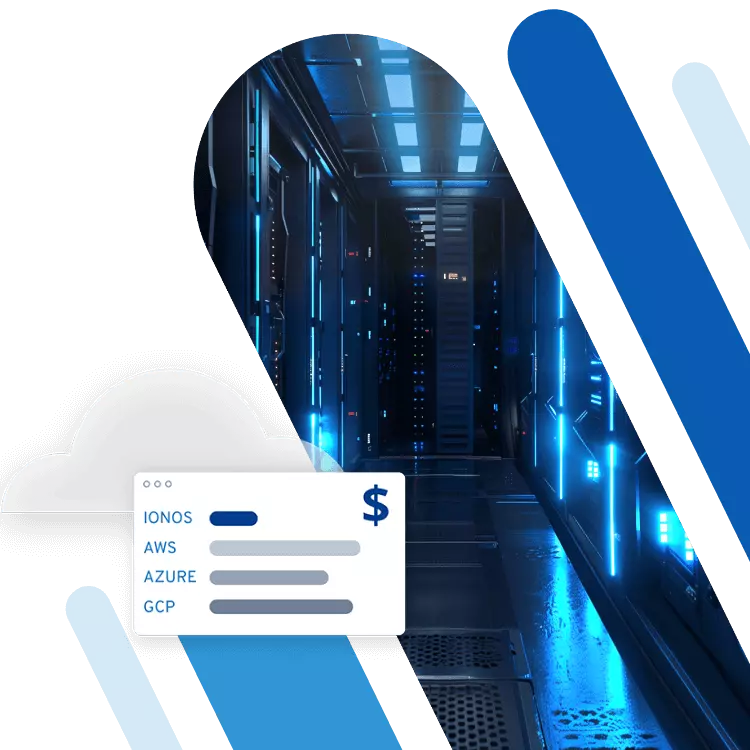Web Hosting Server Comparison
If you want to make information or applications available online, you need a solid and tailor-made server foundation. It doesn’t matter whether it’s a hobby website, a fan forum for your favorite band, or an extensive company database. There are equally as many different hosting possibilities with specialized providers as there are different website operator projects. This is where a server comparison comes in handy. It is important to consider how much server performance is needed for the implementation. While projects like online stores or database servers are thwarted by an inefficient hardware foundation, the expensive resources of professional hosting can clearly surpass the demands of simple websites such as blogs or forums. A hosting server can be booked in different performance levels. The products range from dedicated servers to virtual machines and cloud-based hosting solutions.
Dedicated server
Every web-based application relies on a server that supplies the data in the network and can be delivered to the client on request. An example is when a user accesses a web application with their browser. A dedicated server makes sure that hardware components are available to the hosting client. In comparison to other hosting possibilities, it involves a physical device in the data center of the provider, whose resources are exclusively accessible to a customer. This ensures the freedom to carry out all configurations exactly to plan, including the choice of operating system. Dedicated servers are suitable for costly web projects that are accompanied with foreseeable resource requirements.
This hosting model is found amongst ambitious development projects, large online stores, and extensive Software as a Service (SaaS) offers. With the correct administration no-one else, apart from the hoster and the customer, has access to the server. This means that the dedicated server offers an additional security benefit. Since the dedicated server involves an independent physical machine, only a limited extension of the server resources is possible. If the web project outgrows the maximum performance, the only option is to relocate onto a more powerful server.
- 99.9% uptime
- PHP 8.3 with JIT compiler
- SSL, DDoS protection, and backups
Virtual server
While based on a limited hardware foundation, virtual servers are not available to individual customers. The resources are instead used by numerous customers simultaneously. With virtualization software, it’s possible to operate several virtual servers (Vservers) on a high-performance host server. The individual virtual machines obtain independence via encapsulation, and a solidly defined proportion of hardware resources (fixed-disk storage, RAM and CPU) is available to every Vserver. The renter of one of these Vservers receives their own IP address, and is free to choose their operating system from the default options. The Vserver, in comparison to the dedicated server, is clearly favorable due to its ability to accommodate numerous servers on one host system. The renter receives root access to the virtual machine by request. Maintaining the host server is the job of the hosting business. This type of server hosting is especially suitable for beginners and web projects where high peak loads are not expected.
Try out your VPS for 30 days. If you're not satisfied, you get your money back.
Cloud server
The cloud server is also a virtual server. It relies on a server cluster rather than the hardware resources of an individual physical machine. User data is mirrored over numerous physical hard drives rather than being deposited on a closed system. Compared to classic hosting, the cloud server offers a comprehensive hardware redundancy that allows both maximum availability and a failsafe performance. Missing or faulty components are compensated for in real time in the server cluster. Since all cloud server resources are made available by the cluster, users can freely scale them. The cloud server also enables a business model that can calculate how much a service was used to the exact minute.
Fluctuating traffic loads are made up for in a user-friendly and cost-efficient way. Cloud hosting is therefore especially suitable for web projects whose load is subject to seasonal fluctuations, as well as flexible testing and development environment. The resource requirements can be adapted to the cloud server in real time, whereas the Vserver, in comparison, permits the power adjustment via a choice of different tariff packages.
You want your own Cloud Server? IONOS offers Cloud Servers with the highest performance and highest level of security. Take advantage of the IONOS free Cloud Server trial now and test your Cloud Server for free for 30 days.
Digression: root server vs. managed server
When conducting a server comparison, you should check in particular whether a root or a managed server is involved. While a range of servers with root access are more tailored toward professional administrators, managed servers are better for beginners.
- Root server: Dedicated servers (where the renter receives access to the root account) are described as “root servers” in web hosting. With root access, the customer has comprehensive access rights and receives extensive configuration options as well as a full control of programs, services, accesses, security settings, and updates. This freedom, however, could lead to applying the wrong settings. Managing the root account therefore requires basic knowledge, otherwise the secure server operation could be compromised.
- Managed server: If you don’t have the necessary knowledge to independently manage the root account you are recommended to rent a managed server. In this case, the server administration will be taken over by the hosting provider. Applications can still be individually configured. A managed server, in comparison to a self-governed server, comes at a cost due to the additional effort on the host’s part.
You want your own vServer? IONOS offers powerful and cost-effective VPS packages. Take advantage of the IONOS free VPS trial now and test your vServer for free for 30 days.

